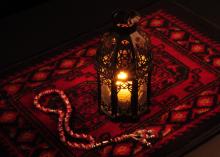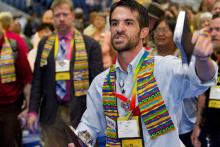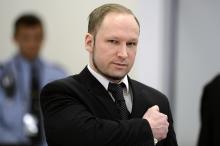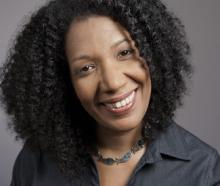Diversity

EDITOR'S NOTE: Ramadan's first day of fasting began today at dawn. This year, Sojourners' Director of Mobilizing, Lisa Sharon Harper, has chosen to keep the fast during the Muslim holy month alongside our friend, Imam Feisal Abdul Rauf. Both Lisa and Imam Feisal will be blogging regularly during the coming days and weeks of Ramadan, sharing with our readers their personal reflections on what the holy month, the fast and journeying together as a Christian and a Muslim means to them. To learn more about Ramadan and its sunrise-to-sunset monthlong fast, click HERE.
LISA SHARON HARPER:
In 2004 I led a group of Intervarsity students on a journey through Croatia, Bosnia, and Serbia on a Pilgrimage for Reconciliation. For four weeks we traveled throughout all three countries investigating the roots of conflict and seeds of peace being planted between the Catholic Croatians, Muslim Bosniaks, and Orthodox Serbs. Along the way, we met with Miroslav Volf, who was vacationing in his home country of Croatia at the time. One of my students asked Volf the same question I asked my mentor years before: “How do you engage in interfaith activity without watering down your own faith?” Volf answered with one word: “Respect.”
He explained that Jesus says the greatest commandment is to love God and to love our neighbors as we love ourselves. Love requires respect. We may not agree with our neighbors, but we must respect their minds and their ability to choose the faith they will practice...
That is why I have chosen to embrace my Muslim neighbors by practicing the Fast of Ramadan this year with a spiritual leader who I admire and look forward to learning from, Imam Feisal Abdul Rauf.
HARRISBURG, Pa. --- The director of the Pennsylvania chapter of American Atheists says he will desecrate the Quran if the state House of Representatives doesn't drop a "Year of Religious Diversity" resolution.
Ernest Perce, of Harrisburg, Pa., said he plans to flog the Quran in the state Capitol Rotunda on Sept. 24 should the House not agree to nullify the resolution before it reconvenes from summer recess that day.
Like the "Year of the Bible" resolution adopted in January, the "Year of Religious Diversity" resolution illegally intertwines religion and state, Perce said.
"The Year of the Bible" resolution is being challenged in federal court by the Freedom From Religion Foundation.

The view from my office in New York City overlooks Ground Zero. Every day I’m in the office, I have the opportunity to observe the massive construction project as well as the thousands of visitors to the 9/11 Memorial pools. It is all a stark reminder of how a person’s faith can be radicalized and politicalized.
Unfortunately, violence perpetrated by those who have hijacked their faith continues to occur on almost a daily basis.
The Islamist terror group Boko Haram has killed hundreds of Christians in northern Nigeria since 2009. The killings have escalated in recent months, and security forces have clearly failed to protect lives, forcing hundreds to flee for safety.
Earlier this month, al-Shabaab from Somalia attacked two churches in Kenya leaving 17 people dead and scores of people injured, including women and children.
However, attacks are taking place against Muslims as well. Last week an Islamic Center in Missouri was torched. Earlier this year a mosque in Queens was firebombed.
Whether deaths occurred or not, all these acts of violence need to be condemned by all faith leaders.
As a Christian leader, let me specifically address the Muslim-Christian conflict.

It’s just 10 days until the biggest show on earth begins.
No, not Lady Gaga’s new tour. It's the 2012 Summer Olympics in London.
The timing of this year’s Olympics has put thousands of participating athletes in something of a quandary.
Writing from TIME Magazine, Aryn Baker explains:
When an estimated 3,500 Muslim athletes come to the London Olympics this summer, the pinnacle of their athletic careers will directly coincide with one of the most important periods in their spiritual calendar. This year, all 17 days of athletic competition take place during the holy month of Ramadan, when Muslims are required to fast and refrain from drinking water from sunrise to sunset....

Every morning, Leo's smile brightens the cafeteria at my elementary school. He hobbles in, holding his teacher's hand. His eyes squint at the bright lights. He squirms at loud noises. And always, he smiles.
"Good morning, Leo," I say as I rub his cheek and look into his eyes. He looks back into my eyes for a split second, then gazes off into his own world. That one-second look is his way to say good morning. Leo is a non-verbal first-grader. He is a student in our K-2 trainable mentally disabled class. He comes to us with Down Syndrome, autism, and wonder.
IN APRIL, THE World Bank’s executive directors selected Dr. Jim Yong Kim to serve as its president. Kim, whose five-year term begins in July, will be the first World Bank president whose primary experience is in community-level development. Most of his predecessors were bankers or politicians.
As a co-founder of Partners in Health, an international nonprofit dedicated to “a preferential option for the poor in health care,” and as a former director of the HIV/AIDS department of the World Health Organization, Kim has done groundbreaking work in delivering essential medicines for the treatment of AIDS to impoverished countries. He has a proven capacity for designing effective solutions to real problems. His election may well usher in a new culture at the World Bank—a culture that focuses not on economic growth that doesn’t trickle down, but on poverty reduction that is real.
For almost 70 years, the World Bank and the International Monetary Fund (IMF) have been major players in the global economy; the World Bank has 188 member countries, all of which must first be admitted to the IMF. In their many years of doing business, these institutions have reinvented themselves more than once. The World Bank’s focus has evolved from rebuilding Europe and Japan following World War II to supporting large-scale engineering projects in so-called “developing” countries; from emphasizing nutrition, population, and poverty in the 1970s to “adjusting” the economic policies of countries in the global South, beginning in the early 1980s.
As the negative impact of IMF policies and World Bank projects on impoverished people and their communities became increasingly evident, people of faith and grassroots groups around the world, particularly in the global South, began demanding change. They organized and advocated for greater transparency, accountability, and participation, insisting that failed strategies promoted and financed by the IMF and World Bank were related to hunger and other poverty-related problems, a growing rich-poor gap in almost every country, and environmental destruction.

At Wild Goose, I was humbled to be among justice-seeking Christians seeking to follow in the footsteps of Jesus.
I see a deep connection between the personal practice of simple living and activism for social change. While I struggle to live justly, particularly in my everyday purchasing decisions (as Julie Clawson advises!), I often don’t live as simply as I could. Sometimes I take shortcuts, going out for lunch, driving my car to work, or buying something to solve a problem that actually requires time I lack because of overcommitment.
As Mark Scandrette points out, for many of us, our slavery to time and money is a choice. We could cut much from our lives and live more simply. We are the global 1 percent.
It’s this voluntary reconsideration of wealth and rediscovery of our Christian justice tradition that made Wild Goose such an amazing experience.
SHAKORI HILLS, N.C. — On a swelteringly hot solstice weekend in the southeast, a couple thousand folks gathered in the woods of North Carolina to get their collective goose cooked. An early summer camp like no other, this second annual festival invokes a Celtic image of the Holy Spirit and sparks unlikely convergences inside the great emergence of the contemporary Christian counterculture.
The Goose blends the best of an intellectually engaged faith conference and social justice activist base camp with the sonic frivolity of a modern rock festival and stirs all concepts and collapses all constructs in a steamy potluck stew of primal camp meeting and postmodern tent revival. Without a doubt, the blossoming and beckoning of the Wild Goose movement in North America heralds a bright radical future for today’s Jesus followers bringing the kingdom come.
Wild Goose Festival: Sunday Call to Worship from cathleen falsani on Vimeo.

American-born imams are nearly impossible to find. Ads from mosques seeking imams who are fluent in English are readily found in Muslim-American magazines and newspapers. The North American Imams Federation, an advocacy group founded in 2002, gets more than 100 requests for help every year from mosques seeking religious leaders.
Hossam AlJabri, a former executive director of the Muslim American Society, estimated that about 80 percent of America’s 2,200 mosques were led by immigrant imams, although the majority have been in America for at least 10 years, many much longer.
According to a 2011 report from the Pew Research Center, 63 percent of America’s estimated 2.75 million Muslims are immigrants — with as many as 90,000 new Muslim immigrants arriving each year. Experts say it will be years before the pool of American imams becomes large enough to meet demand from mosques.

I was thirteen years old, a freshman in high school. This was my first mission trip – a week of working in an elementary school in the Lower Ninth Ward of New Orleans.
Inner-city urban experience, meet private-school-raised girl.
School grounds within the walls of my church, meet bars and constant police surveillance.
The students we were going to serve looked a lot like me, but I could not feel further from their experience
 In the last two years, 17 women — journalists, photojournalists, novelists, poets and playwrights — were honored with a Pulitzer Prize for their work.
In the last two years, 17 women — journalists, photojournalists, novelists, poets and playwrights — were honored with a Pulitzer Prize for their work.
We know from Sandi Villarreal's post, "10 Reasons Why I Don't Know What Century I'm In," what some folks' skewed mental image of what a woman journalist or writer is, so we thought we'd show you what a few of the REAL women of journalism and letters actually look like.
Learn more about these accomplished real-life women of letters inside the blog.
RALEIGH, N.C. -- With only a few days remaining before North Carolinians vote on a state constitutional amendment to ban same-sex marriage, the Rev. Earl C. Johnson took five minutes on Sunday (April 30) to give congregants 10 reasons to vote against the measure.
It was his only concerted effort to wade into a subject considered taboo in most African-American churches: homosexuality. Not wanting to risk his job as senior pastor of Martin Street Baptist Church, or upset his many older congregants, Johnson figured the best approach was to stick to the facts.
The state already forbids gay marriage, he told church members. The state's top Democrats, including the governor, oppose the measure. The constitutional amendment might strip unmarried heterosexual women of domestic violence protections.
None of the points he outlined touched on the central issue: how the church might respond to gays and lesbians.
"It's a traditional church," said Johnson. "When you get to be a certain age you don't budge on your point of view. It would take years of chipping away at it to change it."

Despite emotional protests and fierce lobbying from gay rights groups, United Methodists voted on Thursday to maintain their denomination's stance that homosexuals acts are "incompatible with Christian teaching."
Two "agree to disagree" proposals were soundly defeated during separate votes by the nearly 1,000 delegates gathered for the United Methodist Church's General Conference in Tampa, Fla.
One proposal would have replaced the "incompatible" phrase in the Book of Discipline, which contains the denomination's laws and doctrines. Both proposals sought to soften the disputed doctrine by adding more ambiguous statements about homosexuality.
Gay rights advocates in the UMC viewed the compromise proposals as the best chance to advance their cause at this year's General Conference, which convenes every four years. On Friday, delegates are expected to debate the church's bans on noncelibate gay clergy and same-sex marriage.
“Question people who have authority, because they tend not to use it well unless you stay on top of them.”
That’s what Ana Garcia-Ashley learned from her grandmother, a seamstress and a teacher in the campo of the Dominican Republic. She was a woman who taught by example, challenging anybody in her small village who misused power. “She would not tolerate anything,” remembers Ana. “She took on whomever—even priests.”
And you can say the same about Ana.
Throughout more than 30 years of community organizing, Ana has put her Catholic faith into action by holding people in power accountable: standing in protest at state capitols, stopping predatory lenders, and blocking deportation trucks by laying her body in the road. “To me there is only one way to be a Catholic,” she says, “and that is out in the public arena, doing something.”
In 2011, Ana became the executive director of Gamaliel, a national network for faith-based community organizing. As “congregational” or faith-based organizers, Gamaliel emphasizes systemic change: engaging congregations in the work of feeding the hungry, caring for the sick, and sheltering the homeless, but also in the work of transforming the oppressive systems that leave so many people without food, health insurance, or homes in the first place.
Ana also is the first woman of color to lead a national community organizing network, faith-based or otherwise.
“I am emboldened and encouraged that leadership in the field has become more representative of our grassroots leaders and organizers,” wrote Ana during her first year as executive director.
Both college and religion are in the news as I write. Republican presidential candidate Rick Santorum called Barack Obama’s faith “phony theology” and spoke of campuses as “indoctrination mills.”
Our main partners in interfaith cooperation at Interfaith Youth Core (IFYC) are college campuses, and as founder and president I’ve set foot on dozens and worked indirectly with hundreds more. My experience offers a very different perspective than Santorum’s. With the right leadership, curriculum, and activities, campuses are places where people can deepen their faith identities and learn the very American art of interfaith bridge-building. In fact, campuses are environments that can model this interfaith bridge-building for the rest of society, a place where students can learn the knowledge base and skill set of interfaith leadership.
Take the University of Illinois, for instance, where interfaith cooperation has been a priority for the better part of a decade. The student leaders of Interfaith in Action include evangelicals, Jews, humanists, Muslims, and Hindus. Together, they mobilized thousands of volunteers from different traditions to package more than 1 million meals for Haiti in the aftermath of the tragic 2010 earthquake. The group is now coordinating a spring conference that will empower student leaders from around the country to engage people of different faiths and act together on pressing issues such as hunger and homelessness. One of the leaders of the effort, Greg Damhorst, told me he does interfaith organizing because gathering people from different faiths to serve others is one way of living out the command of Jesus to offer comfort to the afflicted.

In light of some recent intense posts - Ultimate Fighting Jesus and Conversation with Rob Bell (re: women in ministry), this list is too funny not to share.
But the brutal fact is that the matter of gender violence isn’t all that funny either. Statistics about gender inequality via UN and UNICEF are even more discouraging.
Regardless where you sit, stand, or wrestle with the issue of women in church leadership, I thought this satirical list was worth sharing for both laughter and even reflection because that’s what good satire forces us to do. And for what it’s worth, I’d encourage you to read some of my thoughts about why I believe women should be included in all levels of church leadership.

The Pentagon is investigating whether military officials ignored complaints from senior officers about a course that was found to have inflammatory and inaccurate content about Islam.
The chairman of the Joint Chiefs of Staff, Gen. Martin Dempsey, ordered the inquiry on Tuesday (April 24), the same day he canceled "Perspectives on Islam and Islamic Radicalism," a training course that asserted that Islam was at war with the West. The course had been offered as an elective at the Joint Forces Staff College in Norfolk, Va., since 2004.
Roughly 20 officers have complained about the course's content, although it's not clear when, or to whom, or what kind of action was taken. "We don't know what was done with those objections," said Cmdr. Patrick McNally, a Joint Chiefs of Staff spokesman.

I opened up the NY Times homepage yesterday to find this headline: On Witness Stand, Norwegian Says He Would Kill Again. Remember this guy? The Times says authorities have described Anders Behring Breivik as a “fundamentalist Christian…obsessed with what he saw as the threat of multiculturalism and Muslim immigration to the cultural and patriotic values of his country.”
He killed 77 people, including 68 teenagers, in Norway last summer.
Although Breivik admits to the murders, he doesn’t believe he should be held criminally accountable—he believes his actions were preventive measures, or, “self-defense.”

The Southern Baptist Convention's top public policy official has apologized for controversial comments he made about the Trayvon Martin case, and the New Orleans pastor who's widely expected to be named the Southern Baptists' first black president has accepted his apology.
Richard Land, who leads the SBC's Ethics and Religious Liberty Commission, wrote to SBC president Bryant Wright to express his “deep regret for any hurt or misunderstanding" his comments may have caused.

Editor’s note: The following written testimony was submitted by Lisa Sharon Harper, on behalf of Sojourners, to be included in today’s U.S. Senate Committee on the Judiciary Subcommittee on the Constitution, Civil Rights, and Human Rights Hearing on “Ending Racial Profiling in America.”
As a Christian organization, Sojourners is compelled to consider the pattern and institution of racial profiling practices abhorrent and a direct threat to the maintenance and cultivation of the inherent dignity of every human being living and working within the boundaries of the United States. We believe every human being is made in the image of God and therefore equally worthy of protection of human and civil rights under the law. Racial profiling not only threatens the psychological and emotional well-being of targeted communities. As demonstrated above, the practice can lead to death.